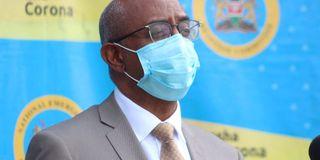Covid-19: Kenya's caseload nears 17,000 as 375 more get infected

What you need to know:
- Health CAS Rashid Aman reported that 128 patients had been discharged from hospitals and home-based care programmes, raising the total number of recoveries to 7,574.
- Nairobi accounted for the highest number of new infections, at 240, and was followed by Kajiado with 36, Kiambu with 31, Migori with 16, Machakos with 15 and Nakuru with 14.
Kenya's Covid-19 caseload rose to 16,643 on Saturday, with the reporting of 375 more infections after the testing of 2,052 samples.
As of July 25, Kenya had tested a total of 268,154 for the virus.
Health Chief Administrative Secretary (CAS) Rashid Aman also reported that 128 patients had been discharged from hospitals and home-based care programmes, raising the total number of recoveries to 7,574.
He said 74 of the recovered patients were being treated at home
CAS Aman said four more patients had succumbed to the virus placing the death toll at 278. He noted that Kenya's fatality rate was between 1.1 and 1.8 per cent.
"Our fatality rate is not high compared to other countries.I can assure you that none of the deaths is as a result of mismanagement at any of our facilities. The deaths do not point to substandard care," he said.

NAIROBI LEADING
Three hundred and fifty one of the new patients were Kenyans and 24 foreigners, whereas the youngest was five months old and the oldest 90. Two hundred and twenty nine were male and 146 female.
Nairobi accounted for the highest number of new infections, at 240, and was followed by Kajiado with 36, Kiambu with 31, Migori with 16, Machakos with 15 and Nakuru with 14.
The ministry said it was concerned about the capital as about 29 of every 100 samples tested were returning positive results.

COMORBIDITY
CAS Aman noted that at least 50 per cent of the people who had died from the coronavirus in Kenya had comorbidities, 15 per cent of them being diabetes.
With the briefing focused on diabetes, the ministry noted that people with the condition were more likely to get Covid-19 compared to the general population.
"When people with diabetes get infected, they experience serious complications and the outcome is not good," Dr Aman said. "It is worse for people who do not manage their condition well by not taking their drugs."
Dr Aman also noted that people with type 2 diabetes are obese, which puts them at an even higher risk of infection.
"Diabetics are advised to remain safe [by staying at home] and keep their blood sugar levels manageable," he said.





